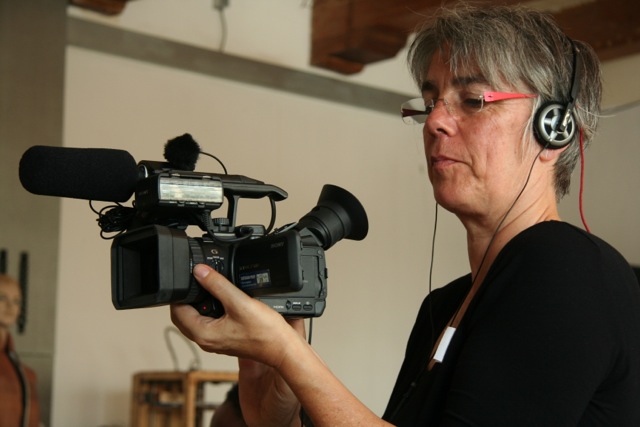Co-creation interview series: Q&A with Janine Prins
What are the innovative ways museums can present their collections to the public, in order to benefit all interested audiences and communities?
RICHES partner Waag Society experiments co-creation practices to start a dialogue with the public and come together to create great, new ideas!
Its staff started moreover an interview series where several museums and team members of the RICHES project are asked about their vision on co-creation within the heritage sector.
This time, Waag did a Q&A with Janine Prins, RICHES member and anthropologist-filmmaker.

Who are you and what do you do within the RICHES project?
I am an independent anthropologist-filmmaker, currently affiliated with Leiden University and researcher-in-residence at Waag Society for the RICHES project.
What does the term “co-creation” mean to you, personally?
An opportunity to discover new approaches by letting go of control and inviting others. For instance: instead of me deciding to make a film and directing it, I let others decide the means and content of communication and expression. The result is a collaborative effort, rather than authorial or institutional. I am curious what such interactive processes might bring in terms of innovative narratives and new communication technologies.
Why is heritage important for our society?
It depends very much on how you define “heritage”… I see it as something fluid, constantly being reinterpreted, remixed, reused both institutionally as on a personal basis. Like one of our research assistants from Moroccan descent, Ilias Zian, always says: «I need to know my past in order to design my future». And then, that contemporary remixing may become heritage in the future.
I believe that in increasingly culturally diverse societies the concept of “heritage” itself needs some reevaluation. Think for instance about the heated debates in the Netherlands around Black Pete.
How could the implementation of new technology affect the heritage sector?
In theory it could all become more accessible, playful and interactive. But technology in itself is not the game changer; people and socioeconomic structures are. And these rarely adapt with the same speed as technological changes. The heritage sector is in itself slow – a unique strength - so that is a nice challenge, to combine two different speeds or temporalities as it were.
What have you learned so far from the RICHES project?
To collaborate with professionals outside my own disciplines and most of all: how situational any approach needs to be, how little we can generalise findings.
Do you have any co-creation tips that you would like to share with others?
In my view co-creation methods are rooted in an ongoing tradition since the 1940s, applied mostly abroad in so-called “development” and “aid” work where the “haves” wanted to “empower” perceived “have nots”. This I find problematic. In our own society, including the heritage sector, it often takes the guise of consultation, rather than real equal creation.
So I would first make absolutely clear to all those involved to what extent you intend to actually co-create. How do you intend to define “co-creation”.
And then, to really benefit from this method, recruiting seems key: carefully organise real diversity of perspectives. Allow enough time and preferably a variety of networks and recruiters.
A third “tip” would be: do not seek compromises too quickly. Allow “wild cards” and unruly multiple approaches; agree to disagree.
An open attitude is essential as well for entering such a process whereby you need to learn to view the world from other perspectives, before starting to generate something new together.
Keep updated about the outcomes of the co-creation process on the dedicated section of the RICHES website!
|
